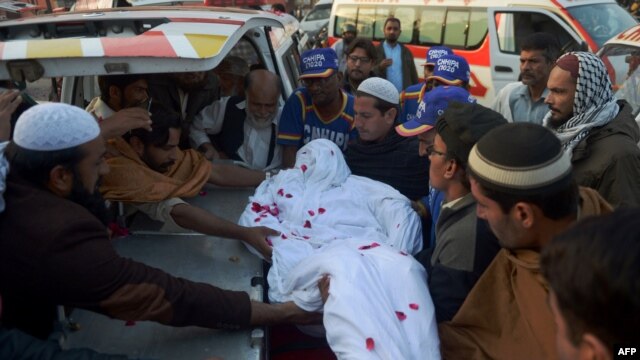Pakistan hangs 12 for 'heinous crimes'
| Publisher | Radio Free Europe/Radio Liberty |
| Publication Date | 17 March 2015 |
| Cite as | Radio Free Europe/Radio Liberty, Pakistan hangs 12 for 'heinous crimes', 17 March 2015, available at: https://www.refworld.org/docid/552f9d7634.html [accessed 6 June 2023] |
| Disclaimer | This is not a UNHCR publication. UNHCR is not responsible for, nor does it necessarily endorse, its content. Any views expressed are solely those of the author or publisher and do not necessarily reflect those of UNHCR, the United Nations or its Member States. |
Last updated (GMT/UTC): 17.03.2015 14:51
By RFE/RL
 Relatives and volunteers move the body of a convicted militant from the banned Sunni militant group Lashkar-e-Jhangvi (LeJ) from the central jail in Karachi to an ambulance after he was executed in early February, more than a month after Pakistan's unofficial moratorium on capital punishment was lifted.
Relatives and volunteers move the body of a convicted militant from the banned Sunni militant group Lashkar-e-Jhangvi (LeJ) from the central jail in Karachi to an ambulance after he was executed in early February, more than a month after Pakistan's unofficial moratorium on capital punishment was lifted.
Pakistan has hanged 12 convicts, the largest number of people executed on the same day since an unofficial moratorium on capital punishment was lifted in December.
An Interior Ministry spokesman said the men put to death on March 17 included not only "terrorists" but convicted murderers and others who committed "heinous crimes."
Prison officials who spoke on condition of anonymity said eight of the convicts were hanged in Punjab Province, while the other two were hanged in the southern city of Karachi.
In Punjab, three murder convicts were executed from the central town of Jhang, two from Rawalpindi near the capital, one from Multan, one from Faisalabad, and one from Gujranwala.
Two other planned executions for March 17 have been stayed by courts due to compromises with the victims' families.
Prime Minister Nawaz Sharif lifted a de facto moratorium on capital punishment on December 17, a day after Pakistani Taliban gunmen attacked a school and killed more than 150 people, most of them children.
Twenty-seven people have been hanged since then, most of them convicted as militants involved in terrorist crimes.
However, last week it emerged that officials have quietly widened the policy to include all prisoners on death row whose appeals have been rejected.
Human rights group Amnesty International estimates that Pakistan has more than 8,000 prisoners on death row, most of whom have exhausted the appeals process.
Rights campaigners have been highly critical of the death penalty, citing problematic convictions in Pakistan's criminal justice system, which they say is riddled with widespread police torture and unfair trials.
The European Union has also raised the issue of capital punishment with Pakistan's authorities – in particular, the case of one man who was condemned to death as a teenager.
Lars-Gunnar Wigemark, the head of the EU delegation to Pakistan, said on March 17 that "executing a person who committed a crime when he was underage is in violation of international law."
"We do not believe that the death penalty is a deterrent," he added. "We are furthermore concerned with possible miscarriages of justice."
The EU granted Pakistan the much coveted GSP+ (generalized system of preferences) status in 2014, giving Islamabad access to highly favorable trade tariffs, conditional on Pakistan enacting certain commitments on human rights.
With reporting by Reuters and Geo TV
Link to original story on RFE/RL website
